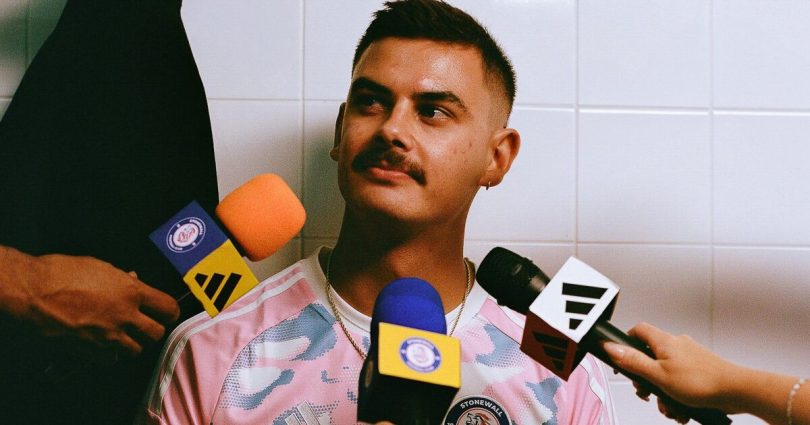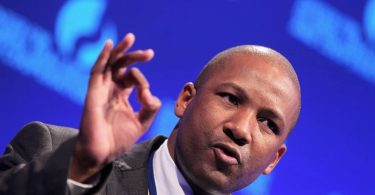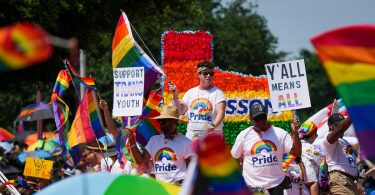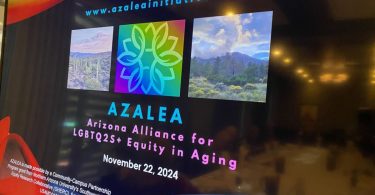Modeling his club’s smart new kit in an official photoshoot with other players is a fantasy football moment for Taidgh Pledger.
“From pretty much as soon as I could walk, the sport has been my life. All my weekends and main friendship groups were built around football,” the 27-year-old tells Outsports.
He’s a Manchester United supporter but in the last two years, he’s developed a deep emotional bond with Stonewall FC, which started up in 1991 as a team for gay men in London.
The club has just released a camo-print “Unity 2.0” jersey in the pink, white and light blue of the trans flag, made by adidas with EA Sports FC as the sponsor logo.
Get off the sidelines and into the game
You rarely see giant global brands partnering with amateur clubs but there is much more to Stonewall FC than its place in the 11th tier of English men’s football would suggest.
In LGBTQ soccer, its dynasty is legendary — the glorious gay equivalent of Real Madrid.
Stonewall FC teams have won 19 gold medals in championships and tournaments over the last 30 years, and have never been off the podium spots at the Gay Games, IGLFA World Cup or EuroGames.
The men’s first team has played at Wembley Stadium and co-founder Aslie Pitter was awarded an MBE for his voluntary service and for fighting homophobia.
The club’s days of being a curiosity for the British tabloids have now all but faded. Yet Stonewall FC’s purpose remains as powerful as ever, attracting a new generation of players and in turn, vital investment.
There is a new home jersey too, in heritage royal blue. Four years of adidas amplification means these eye-catching kits are coming to much wider attention. On National Coming Out Day, the players’ stories are worth amplifying too.
Pledger was born and raised in south London but the thought of turning out for Stonewall FC one day would never have crossed his mind as a teenager.
“I went to an all boys’ school that had a toxic masculine culture. Growing up, that felt limiting for me.
“So I didn’t come out until I went to university and started meeting other queer people, and going out to queer spaces. Growing up in London, you’re aware of that world but you don’t always have an entry point to it.”
His coming out experience was positive and his family were supportive. Yet football still didn’t fit. It felt “incongruent” with being gay beforehand, and Pledger continued to sense that after coming out too.
He put some space between himself and the game for a while, not wanting to be constrained by its conformity. When he got back into playing, he wasn’t as immersed as before.
“What I’ve always really enjoyed about the game is the social element, but with that came this feeling that I had to hide myself. I thought that if I didn’t hide, I wouldn’t be fully embraced.”
Upon finishing university, he moved back home and played casually with friends for a few years. But it wasn’t enough.
“I wanted to get back into the structure of playing 11-a-side but I also realized that I didn’t have that many gay friends in London.”
He reached out to Stonewall FC who encouraged him to come along to training. He’s now been there just over two years.
“The club has showed me there is a world in football where I can be fully accepted for who I am. It’s made me feel so much more proud of my sexuality.
“Because coming out isn’t the end of the story. There is a journey of acceptance that continues. Being part of Stonewall FC has allowed me to get to where I am now more quickly.”
In 2021, the club launched its first team for women and non-binary people. Around 12 players attended the first session. Among them was Ioanna Kokkinopliti, originally from Greece and then in her second year of living in London.
“Stonewall changed my life,” she says. “It’s a safe haven for me because London has been a really difficult city these last few years. I’ve made friends who always have my back if something happens, and I know they’ll be friends for life.”
Her experiences of football back home had not encouraged her to accept herself.
“The game was seen as bad for girls and I wasn’t allowed to play for a long time. I tried to play in secret, with no one on the sidelines supporting me but when my parents found out, I had to stop and start doing ballet instead!”
In her town of Katerini, stereotypes about girls in team sports created a vicious circle. “No one was out as gay back then but years later, I realised most of the girls I played football with are lesbians.
“As for me, I wasn’t able to come out to my parents at the time because I understood that football meant something bad to them.” It was as if the game itself would be blamed.
So it’s ironic that in recent years, Kokkinopliti’s family ties have in fact strengthened because of her involvement with football.
Through taking part in the club’s activities with adidas, and being visible in its values-driven marketing, she has seen the attitudes of loved ones switch up in a way she could never have imagined as a teenager.
“Now my parents see football as something else, and they care more,” she explains. “They can see how happy Stonewall FC made me.
“Also, my brother back in Greece is a big Liverpool fan, and someone who is obsessed with football.
“He used to be quite homophobic and at first, he didn’t know what Stonewall FC was. But when I was in the last adidas campaign, he shared the pictures on his Instagram and wrote, ‘proud of my sis.’
“He got so many bad comments for that but it was the first time I’d heard him really supporting me. I cried because I hadn’t had a good relationship with him before that. It was a big moment in our family.”
It’s the kind of assurance all LGBTQ people hope to experience when they open up. Kokkinopliti’s emotion may have been delayed from her youth but it demonstrates how coming out is an evolution.
“This was all about family accepting me better, and it happened in a deeper way because of football and Stonewall FC.”
Related
Stats and numbers also point to how the name of Stonewall FC resonates strongly with LGBTQ people who love football, and not just in London.
The club’s overall membership has tripled since the introduction of the women and non-binary team. More than 600 shirts from the first-edition Unity kit have been sold worldwide, including in the U.S., Australia and Mexico. Meanwhile, this season’s league table is so far looking healthy for the men’s first team, with five wins, one draw and no losses.
But success on the pitch is not the be-all and end-all for Stonewall FC, which has its own version of Barcelona’s famous “més que un club” slogan. Theirs is: “Proud to be more than a football club.”
That’s the message behind the “Unity” trans pride kit. Pledger says: “Given the political environment at the moment, I want someone to see that shirt on social media and know there’s a place for everyone to enjoy this sport.”
Kokkinopliti agrees. “I have friends who knew they were trans from a young age, even when they didn’t know the word ‘trans’. We’re showing to the world that we’re a team of inclusion, and it makes me smile.”
Commonly, LGBTQ people find themselves explaining to those outside the community that Coming Out Day is not about having a day on which to come out. We describe how for many LGBTQ people, it’s simply not safe for them to come out.
We try to show why it still requires courage to say the words out loud and that closet-busting stories inspire others to think they could do the same.
But perhaps more than anything, we point out that coming out is not a one-off occasion in our lives. It’s a process, and LGBTQ sports teams worldwide are essential mechanisms in our community that make that journey smoother.
“There are so many wonderful clubs, whether it’s for football, rugby, anything,” says Pledger. “It’s a beautiful thing to be part of one.
“Everyone I spoke to here at Stonewall FC says it really has enriched their lives.”
Subscribe to the Outsports newsletter to keep up with your favorite out athletes, inspiring LGBTQ sports stories, and more.







